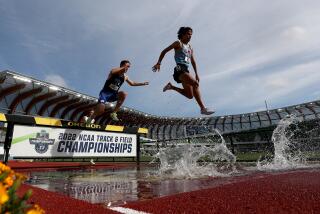Loyola President Satisfied With Reaction : Loyola Marymount: Loughran says university not planning investigation into the death of Hank Gathers.
- Share via
The president of Loyola Marymount University said Thursday that, to date, he has been completely satisfied with his athletic administration’s handling of the Hank Gathers situation.
Father James N. Loughran, in an interview in his campus office, called a letter--dated Dec. 21, 1989 and signed by Dr. Michael Mellman of the internists medical firm of Mellman and Moe--his main exhibit on behalf of the university. The letter, he said, released Gathers for “full participation” within seven to 10 days of Dec. 21.
Gathers died Sunday after collapsing in a West Coast Conference tournament game against Portland. He was later pronounced dead at Daniel Freeman Marina Hospital. Gathers had collapsed into momentary unconsciousness in a game on Dec. 9 and was later diagnosed to have a problem with his heart rhythm. Gathers returned to play Dec. 30.
Mellman has admitted to signing and sending the letter, after consultation with Dr. Vernon Hattori, a cardiologist, and Dr. Charles Swerdlow, an electro-physiologist. None of the doctors are willing to comment further, pending a meeting with the Gathers family. The family has been unwilling to meet with the doctors.
“That’s my starting point on all this,” Loughran said. “I feel at ease with that, with having that letter. We had the doctors. The best doctors.”
Loughran said the specifics of the letter, which was written by Mellman at the request of Lane Bove, Loyola’s vice president for student affairs, have not been made public. The school’s lawyers say it needs to be jointly released by the doctors and Loyola because of potential problems with the confidentiality of student records. But he said that the contents of the letter are quite clear--that Gathers was to ease back into practice, be monitored by the doctors for a week to 10 days and then be cleared to play.
“That’s the way I look at it,” Loughran said. “How could we possibly be liable?”
Nevertheless, Loughran said that Loyola’s lawyers, the firm of Burke, Williams and Sorensen of Los Angeles, had been contacted Thursday by a lawyer representing the Gathers family. He had no further details.
Loughran, president of Loyola Marymount for the last five years, said that, despite a lengthy list of questions being raised over Gathers’ death, he planned no internal investigation at the moment.
“As soon as I had some sense that we did anything improper, I’d have an investigation immediately,” he said. “But right now, I have no sense of that. I do ask questions as things arise, but I have found nothing that disturbs me.”
He said that he is at a loss to explain why one cardiologist has been quoted as saying that Gathers had been told by doctors not to play.
“If they had told us that, he would have never been allowed to play,” Loughran said. “My people would never have permitted him to play without permission.
“The whole thing baffles me. Why would doctors allow him to play if there was any chance that he would die? What possibly could motivate people who have such high professional integrity?”
Loughran also saw little likelihood that anybody on his athletic staff had been told that Gathers was risking his life.
“Did they tell us that?” Loughran said. “I can’t imagine, with the quality of people on our staff, that they’d take any kinds of gamble like that. No, it seems to me, with the existence of the letter we have, that all that is answered from our side.
“I was there when Hank went down, and I saw the way the players reacted, and the coaches. It was so genuine, almost pure. I didn’t pick up any guilt, any remorse.”
Loughran said that he found nothing particularly unusual about the timing of the school’s purchase of a defibrillator shortly after Gathers returned to practice in late December. The machine is used to shock a failing heart back into normal rhythm.
“That doesn’t surprise me at all,” Loughran said. “My people are always upgrading our equipment, always talking about being first class in what we have. Plus, after the first incident, that would be the kind of thing to stop you a bit, to tell you it might be best to have one around. I think that’s plausible.”
More to Read
Get our high school sports newsletter
Prep Rally is devoted to the SoCal high school sports experience, bringing you scores, stories and a behind-the-scenes look at what makes prep sports so popular.
You may occasionally receive promotional content from the Los Angeles Times.







